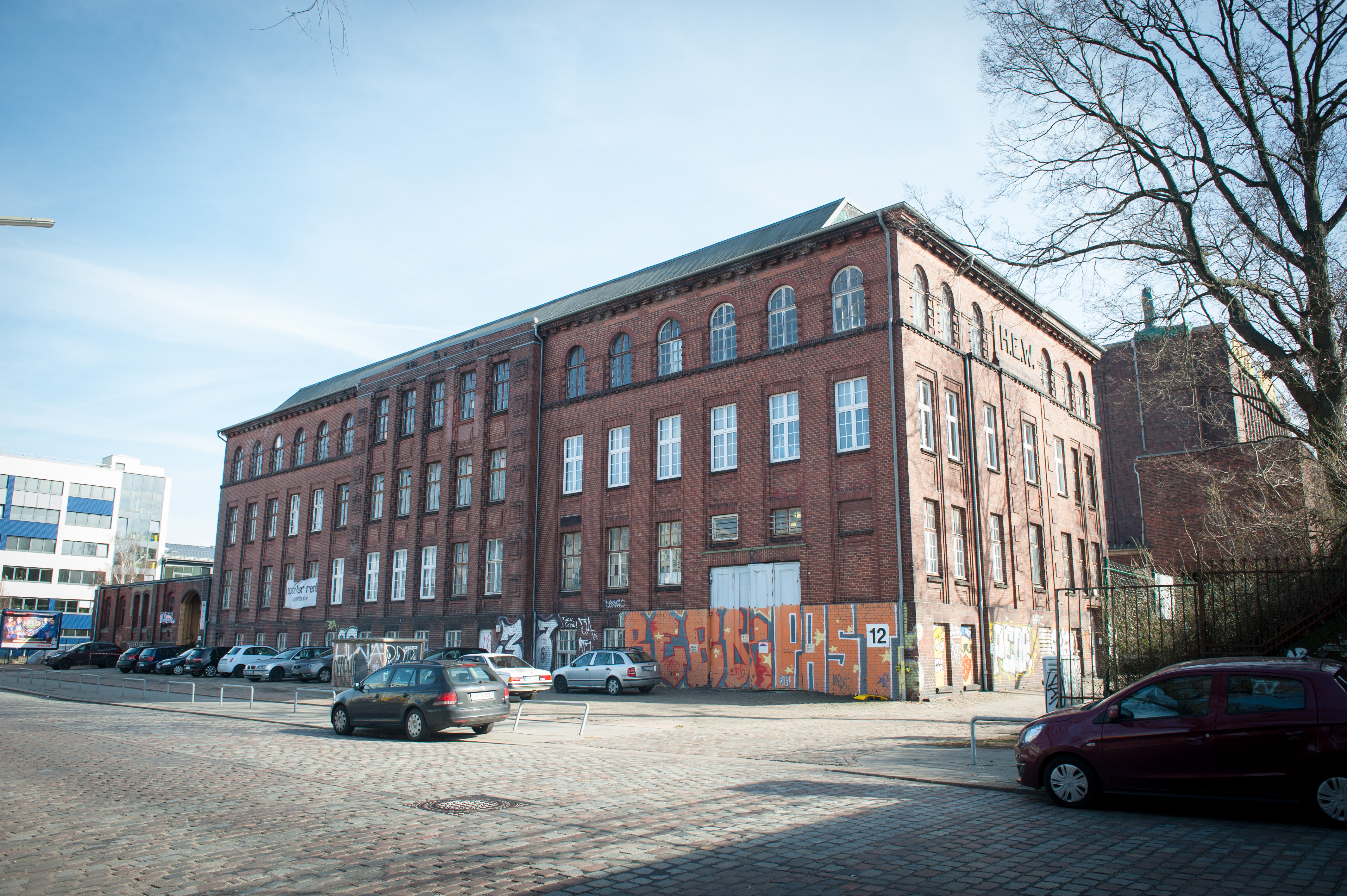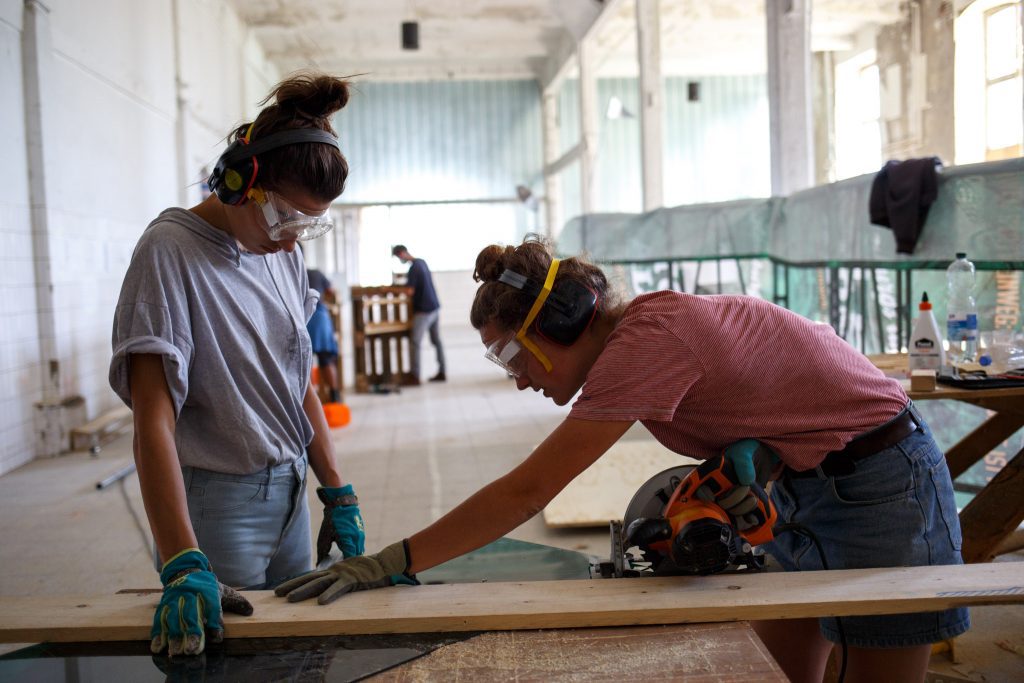The HALLO: collective aims to reactivate not publicly accessible spaces in the city of Hamburg. The collective organizes a yearly summer festival, HALLO: Festspiele, and it is developing a strategy to gain long-term concepts for unused space and funding to support its activities. Among their projects, Schaltzentrale, an experimental neighbourhood office, is specifically dedicated to giving space for art creation and sociality in Kraftwerk Bille, a former power station in a transforming neighborhood defined by industry and businesses.
What is HALLO: collective and how was it formed?
We started in 2014 by inviting people to join an open group. Most of the joining members were already working in the organization of big festivals and we planned to use these skills to conquer unused space. In the beginning, we were organizing small events moving across venues around the city and we called them Hallöchen (small Hallos). We started off by financing the first HALLO: Festspiele ourselves: we had a one-week festival which included building it up and tore it down as part of the public program. For the following year edition, we received 56.000 euros from the biggest fund for the independent scene in Hamburg. In organizing the festival we maintained the same concept but we used the fund to invited many partner organizations that are also working in artistic space production like Plataforma Trafaria from Portugal, Yes We Camp from France and we focussed on experimental architecture that year.
Since the very beginning, we have been searching for a place to rent, but at first, we didn’t have any money available. Meanwhile, we mainly tested out modes of organization and communication and strategies of how to artistically open up spaces. In 2016, we accessed Schaltzentrale, a venue located in Kraftwerk Bille that was bought by MIB in 2015, an investor who also owns property in Leipzig and in Nürnberg and who is using subculture as a mean to activate old industrial site and thus increase the property value. That’s why the owner was willing to give us the space for free for temporary use, benefitting from our work to raise awareness about the site. We only pay utilities here. This allowed us to create a concept for this space and we established an experimental neighborhood office.
By creating this space with a network of people who live and work in the area, we want to redefine the meaning of work by adding cultural, associative and educational work to the classical definition of industrial and “regular” businesses. By emphasizing that it’s a working neighbourhood that is also producing space, we don’t just want to intervene in this specific building but to have an impact on the entire area by using this building to support the growth of a network around it.

What type of group came together?
This is a group of culturally engaged people such as artists, composers or writers, but the group is growing and there are also members with diverse backgrounds and practical expertise which are essential here. For example, Tommy, one of the very few people still living in this neighborhood, used to work in airplanes constructions but he also has experience as a chef and as a deejay. Another member of our team is the technical director of one of the biggest museums in Hamburg and another is an Arabic and English teacher.
Ever since we got access to this space, the team changed because there is the possibility of just coming by for team lunch, people come and work in the area, or in the house itself. Many team members have a background in culture, and not in urban planning and this is why we have been mainly hosting artistic events for the past four years. In 2017 we received a big fund for Schaltzentrale to strengthen our collaboration with refugee shelters nearby (one of the only residents in this industrial area), which was cut down a lot the following years. We would wish for long term funds that understand the work of a transdisciplinary neighbourhood office for the common good and thus addresses all parts of the neighbourhood as equal.
How did you gain visibility and became a neighbourhood representative? Why did you take this role and what does this imply?
In the past, this area used to be inhabited by about 70.000 people, but after the Second World War bombing, only a few residential apartments were left. The city recent urban development program wants to implement more residential buildings in this area and to attract population here. This location is mentally perceived as very far from the city center because it is empty, but we are just one stop from the main train station.
We started by coming here with an agenda – we wanted to host a temporary event to start a long term opening of a space – so we wanted to first understand the context and get to know people. To get in touch and also for practical reasons we then started to collect a lot of material from the companies in the neighbourhood. . There are many industries around and they are always happy to give away something. In time, some partners established the association, and we were during a lot of events together. We also went to the local bar to meet people and we used to have long walks around and some of us worked or lived here already.

From the beginning we foresaw huge changes in this area, and we have already experienced some: for example, the rowing club is endangered and might be replaced. Many artists living in this area have been threatened by eviction as well. In 2018, together with HafenCity University, we started to develop a mapping process to map the changes and potentials of the waterscape of the river Bille that is going through the whole area. Before, we were focusing more on building a network but now we are getting into the phase of concretely discussing what is happening in the area and this interests the people. For me it is an exciting change: I was tired of doing just pop-up festivals that are coming and going and I wanted to develop a concept that was more connected to the place and which would contribute to the area somehow.
What is your relationship with the local administration?
We got in touch with politicians for fundings and to get permits. They progressively improved their opinion on us and this helps us in accessing public tenders. We now applied to a call for developing a park in an old recycling area and to communicate a whole new green strip connecting the three main water scapes in Hamburg. The recycling site is completely in concrete and the administration is planning to have 3 years of temporary use in between. These projects help us grow out of this space which is a meeting space for us, but we still want to consider the neighborhood as a whole.
In 2017, we started an auditive exploration of the space with our festival HALLO: Festspiele. This auditive program consisted of installations, walks and concerts. Because this program was very specific, it received big financial support from the state and it helped us improving our public especially in the eyes of the city council and of our landlord. Since then, we connected with other artists who work in the many empty spaces spread in Hamburg, and we are now discussing the possibility of taking over one of the buildings as a cooperative.
In Summer 2018, together with neighbours like the design studio blackSchwarz and Amelie Rost, an architect specialized on floating architecture, we built a pontoon on the river raising the theme of water as a public space. We also had an intense and fruitful collaboration with HafenCity university, Antje Stokman, Kathrin Wildner and Dagmar Pelger in particular, and started a mapping process of the water scapes of the river Bille. The summer was extremely hot and we had a wonderful festival: people were swimming in the river and going on all sorts of floating vehicles. Usually, people can’t reach the water as the river has always been only used as an industrial system of transport. At the moment there is only two entry points to the river, one is an informal access to the water from a small park and another one is from the rowing association RV Bille with whom we are collaborating who lets people get in.
What type of contract do you have for this building?
The owner is still deciding on the exact building function and wants to start a refurbishment only once space has been rented but gave us time to establish our work. This building is rundown and for us, this is an advantage: we estimated about 20 million euro just for the basic renovation. We became close to the owner’s representative who has joined us in the Actors of Urban Change project and she is supporting us in the research for opportunities to find a permanent space for our organization. This collaboration has improved our rental situation a lot.

For our neighbourhood office, Schaltzentrale, we always have a one-year-long contract which can be terminated with six months notice. We are trying to extend it to two years and eventually secure a longer-term bigger space. At the moment we are using the entire Kraftwerk Bille venue but they might rent parts. As a cooperative with working neighbours, we would like to get access and buy the next-door building. This building would be in better shape as it features 3 or 4 storage units, it has a heating system, and is less humid. Together with a network of neighbors, we applied for a National development program and we got into the top ten but we didn’t get the grant. This was our last disappointment. The call was in July and we received a rejection answer in September, so we are still planning our next move but keep on working on the topic with other means.
What is your next step?
We are working on this year HALLO: Festspiele edition, and we are also members of the Actors for Urban Change project therefore we will host its final meeting here in Kraftwerk Bille. The focus of the meeting will be the possibility of establishment of cultural and common use space in private property. We hope to take this opportunity to advocate for a cooperative “House of New Work” at Kraftwerk Bille, and we’ll address the possibility of stopping this spiral of raising the value of the space and therefore facing eviction.
Interview by Levente Polyák with Dorothee Halbrock and Alice Barkhausen on October 26, 2018.


